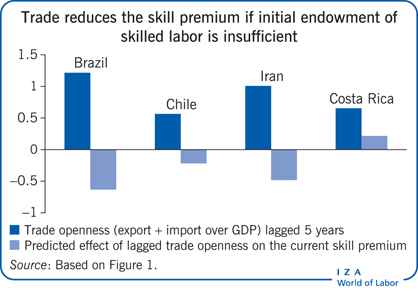Elevator pitch
Liberalization of foreign trade and investment raises the domestic ratio of skilled to unskilled wages (skill premium) if the country has a sufficiently well-educated workforce, but lowers it otherwise. Wide wage inequality is undesirable on equity grounds, especially in poor countries where the bottom wage is close to the breadline; but it gives parents an incentive to invest in their children’s education. The incentive will be ineffective, however, if parents cannot borrow for their child’s education because of underdeveloped credit markets or because they are too poor to finance the investment from their own income and savings.

Key findings
Pros
In developing countries with a sufficient stock of skilled labor, liberalization boosts the skill premium and increases the incentive for parents to invest in their children’s education, provided that liquidity constraints can be addressed.
A fall in the skill premium redistributes income from the rich to the poor.
Regardless of the initial stock of skilled labor or the effect on the skill premium, liberalization raises average income and reduces child labor (encourages investment in education).
Cons
In developing countries with a sufficient stock of skilled labor, liberalization redistributes income from the (unskilled) poor to the (skilled) rich, making it harder for parents who are poor to invest in their children’s education.
If a country lacks enough educated people when it liberalizes, wage inequality will fall, but the incentive to invest in children’s education will weaken.
Foreign investment reduces the demand for skilled labor in countries where the supply is low.